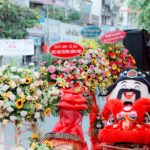The Eight Immortals, or Bát Tiên in Vietnamese, is a group of eight mythological beings revered by the Taoist tradition. These immortals are believed to reside on the island of Penglai, each with their unique history of ascension and individual magical powers.
1. Who are the Eight Immortals?
The Eight Immortals are eight mythical beings in Taoist folklore. They are believed to live on Penglai Island, each with their own path to immortality and unique magical powers.
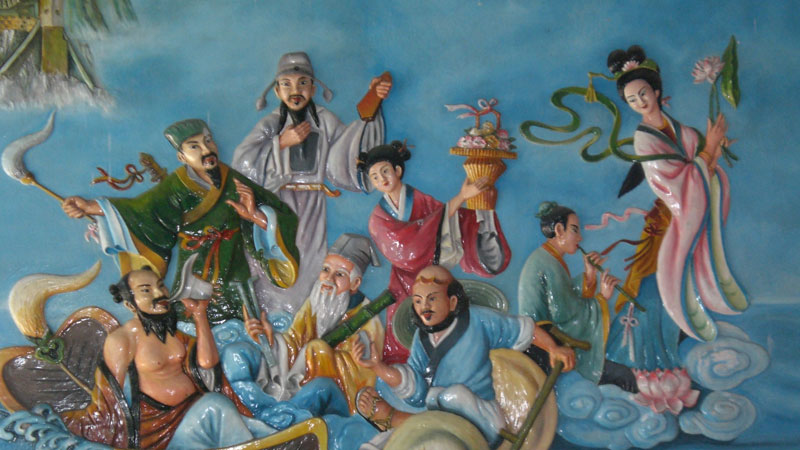 The Eight Immortals are eight mythical beings in Taoist folklore
The Eight Immortals are eight mythical beings in Taoist folklore
According to legend, they all consumed the elixir of immortality and peach of longevity, achieving eternal life. They are symbols of longevity and health. The Eight Immortals are akin to saints, and their presence in homes is believed to bring good fortune, peace, and happiness to the household. Thus, they are often featured in sculptures, paintings, and decorative household items, invoking their blessings.
2. Who are the Eight Immortals?
The Eight Immortals consist of Li Tieguai, Han Zhongli, Cao Guojiu, Lü Dongbin, He Xiangu, Lan Caihe, Han Xiangzi, and Zhang Guolao. Each immortal has their distinct background and abilities, so it is essential to understand them if you wish to invite their presence into your home.
Li Tieguai
Li Tieguai is considered the most powerful of the Eight Immortals and the first to achieve immortality, helping the others attain their divine status.
Also known as Li Xuan or Li Tongyuan, he had the ability to separate his soul from his body and travel in spirit form. On one such journey, his disciples mistakenly cremated his body, forcing him to inhabit the corpse of a beggar who had starved to death.
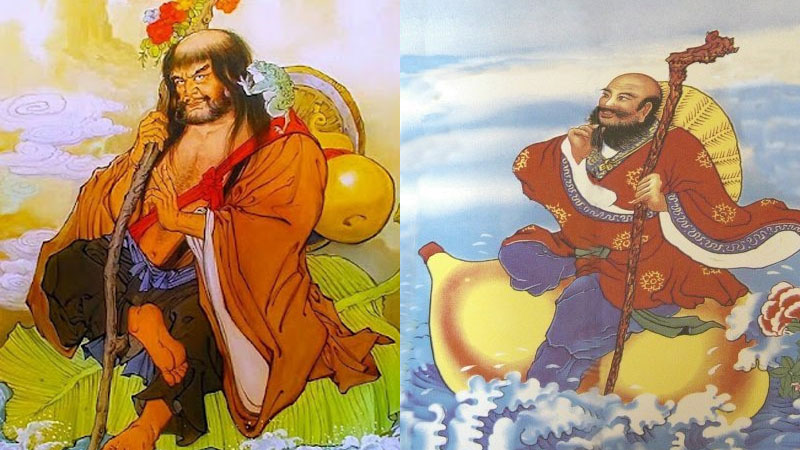 Li Tieguai
Li Tieguai
Since then, he has appeared as a beggar with a lame leg, carrying a gourd, and leaning on an iron crutch, yet possessing immense magical powers and healing abilities.
Han Zhongli
Han Zhongli, also known as Han Xiangzi, is revered as the “Zhengyangzi” in the “Northern Five Schools of Taoism.” He is often depicted as overweight, with curly beard, wearing an open-chest shirt, and exposing his round belly.
Han Zhongli is known for purifying holy water and using his magical fan to rescue people in danger. Thus, he symbolizes abundant health.
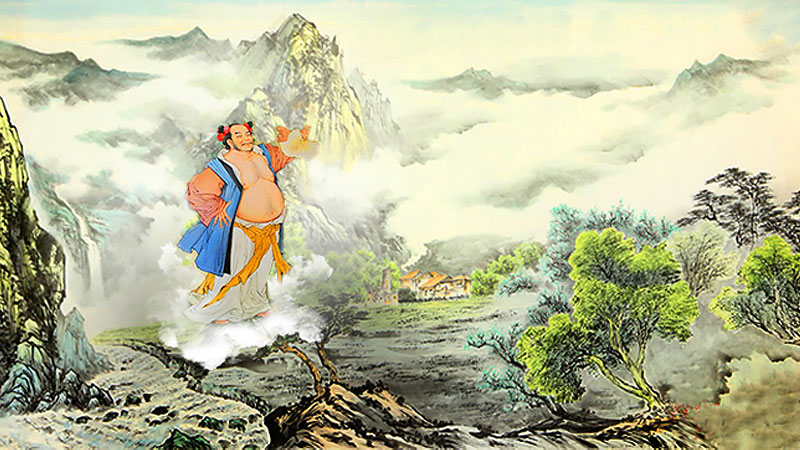 Han Zhongli
Han Zhongli
Cao Guojiu
Cao Guojiu was the son of Empress Cao, during the Song Dynasty, hence the name “Guojiu”. He was a skilled drummer, earning him the title of “Ancestor of Actors”.
Cao Guojiu was close friends with Lü Dongbin and Han Zhongli, but he eventually renounced his privileged life to pursue immortality. His attire sets him apart from the others, as he is often dressed in an official’s robe, symbolizing nobility. Thus, Cao Guojiu represents career advancement and smooth sailing in life.
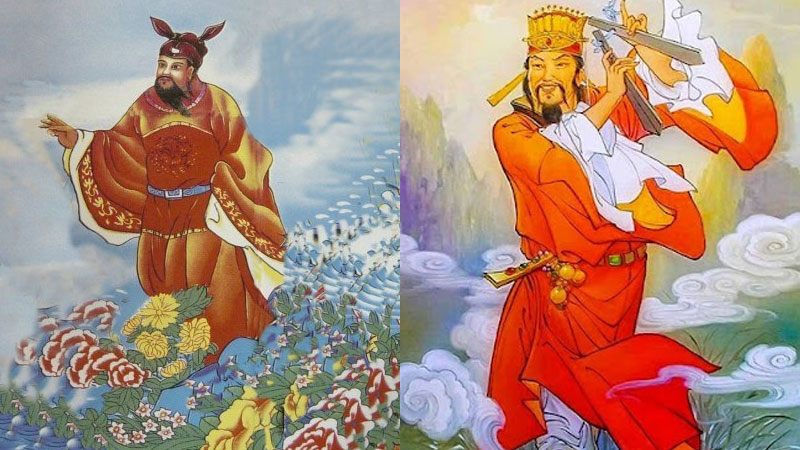 Cao Guojiu
Cao Guojiu
Lü Dongbin
Lü Dongbin is the most well-known of the Eight Immortals. In the book “Liexian Quanzhuan”, it is recorded that “Lü Yan, courtesy name Dongbin, was from Yongle in the Tang Dynasty”. He failed the imperial examination twice and, at the age of 64, met a Taoist master in Chang’an who guided him on the path to immortality.
As a practitioner of Taoism, Lü Dongbin often used a feather duster and a sword to exorcise demons and heal the sick. Placing him in your home invokes protection and good health.
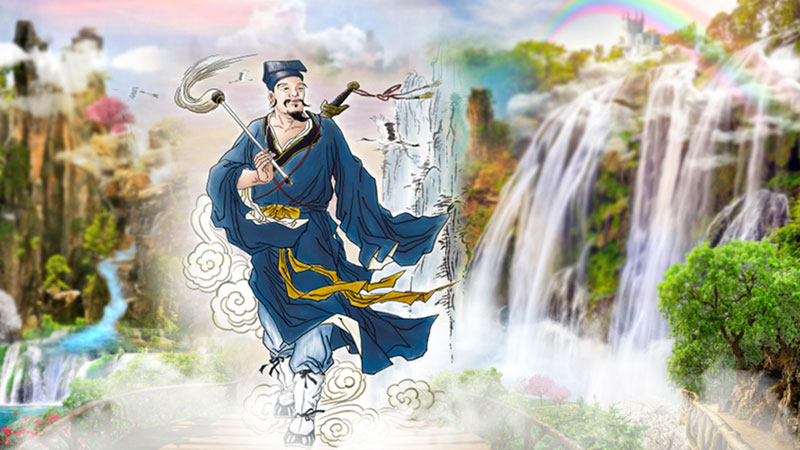 Lü Dongbin
Lü Dongbin
He Xiangu
He Xiangu is the only female among the Eight Immortals. She was born in the Tang Dynasty, with the surname He and the given name Qiong. As a child, she encountered a hermit who fed her the peach of immortality, after which she disappeared. This experience granted her the ability to foresee fortune and misfortune, earning her respect.
Upon attaining immortality, her symbols became the lotus and the feather duster. Placing her in your home invokes abundance and good luck.
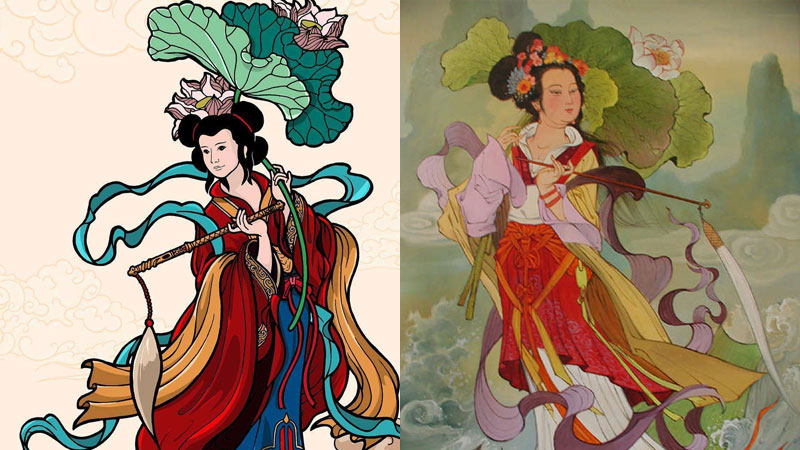 He Xiangu
He Xiangu
Lan Caihe
Lan Caihe is believed to be the incarnation of Chi Ji, the Red Legged Divine Lord from heaven. Lan Caihe is described as a young boy (some accounts say girl) carrying a basket of flowers. He typically wears a loose green robe with a black sash, barefoot on one foot and wearing a shoe on the other. Interestingly, he wears a cotton-padded jacket in summer without feeling hot and a single garment in winter without feeling cold.
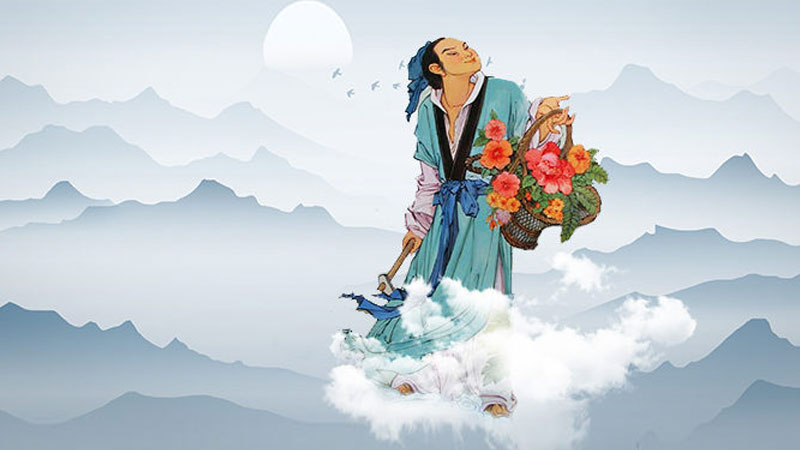 Lan Caihe
Lan Caihe
Lan Caihe attained immortality after a drunken stupor that caused a heavenly commotion, and a goose brought him back to heaven. However, he still visits the mortal realm, singing and drumming in the marketplace for alms, which he then donates to the poor. Thus, Lan Caihe symbolizes health, joy, and charity.
Han Xiangzi
Han Xiangzi was a native of Xiangli in the Tang Dynasty and, according to legend, the nephew of the renowned calligrapher and painter Han Yu. He is also said to be a friend of Lü Dongbin, through whom he attained immortality.
Han Xiangzi possessed the extraordinary talent of playing a magical bamboo flute that attracted all things good. His flute playing could revitalize trees and promote their growth.
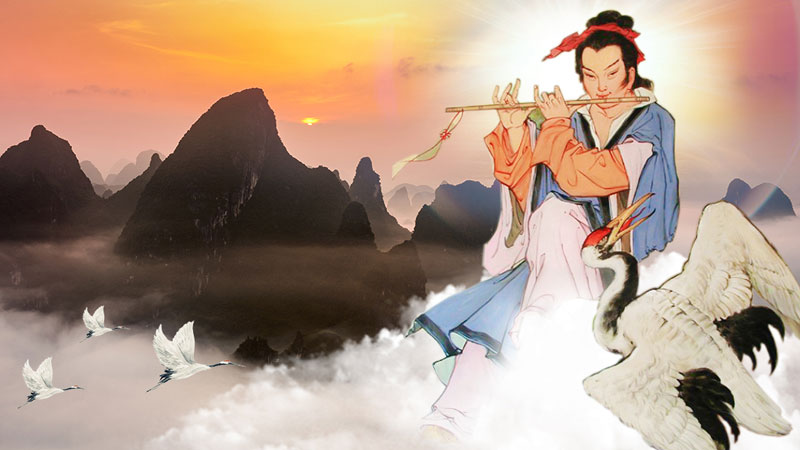 Han Xiangzi
Han Xiangzi
Zhang Guolao
Zhang Guolao was a master of the esoteric and mystical arts. He is often associated with a drum and a donkey. When riding, he would sit backward on the donkey, and when not riding, he would carry the donkey in a straw bag slung over his back.
He also carried a reed-like musical instrument and sang as he walked. Zhang Guolao symbolizes wisdom and mental acuity for the elderly.
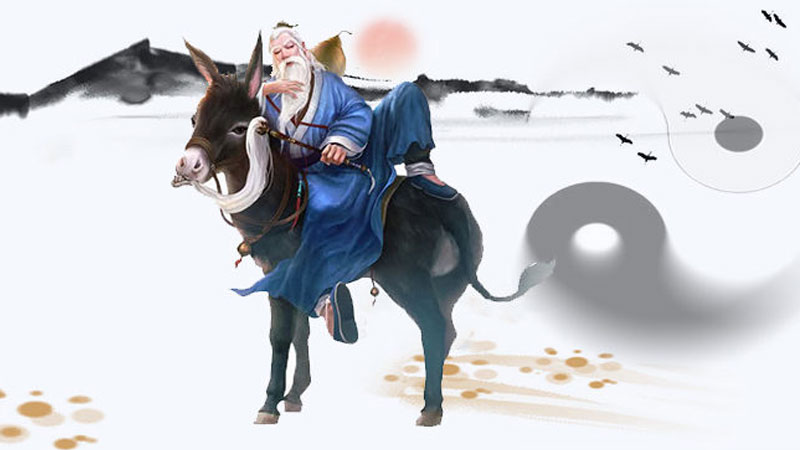 Zhang Guolao
Zhang Guolao
3. The Significance of the Eight Immortals in Feng Shui
Each of the Eight Immortals carries their own significance. Inviting their presence into your home brings health, wards off illness, bestows wisdom, and promotes a fulfilling and happy life for all family members.
Additionally, they bring mental acuity to the elderly. They are also believed to ward off evil spirits and negative influences, such as ghosts and demons, from your home.
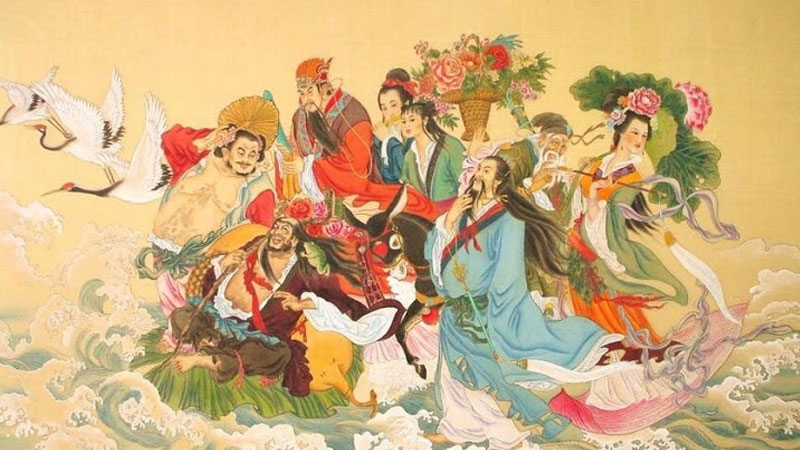 The Eight Immortals bring good fortune and blessings
The Eight Immortals bring good fortune and blessings
In Feng Shui, the number eight is associated with wealth and prosperity. Furthermore, in the Chinese language, the word for “eight” sounds similar to “fa,” implying financial success and abundance.
4. Placement of the Eight Immortals in Feng Shui
When Displaying the Eight Immortals Together
When displaying the Eight Immortals together, whether in paintings or sculptures, place them in a high and energetically positive location, such as on a tall table in the living room or on decorative shelves. Avoid placing them in less clean areas like the kitchen, bathroom, or bedroom.
In terms of direction, face them toward the east, southeast, or your lucky direction to ward off negative influences and attract positive energy.
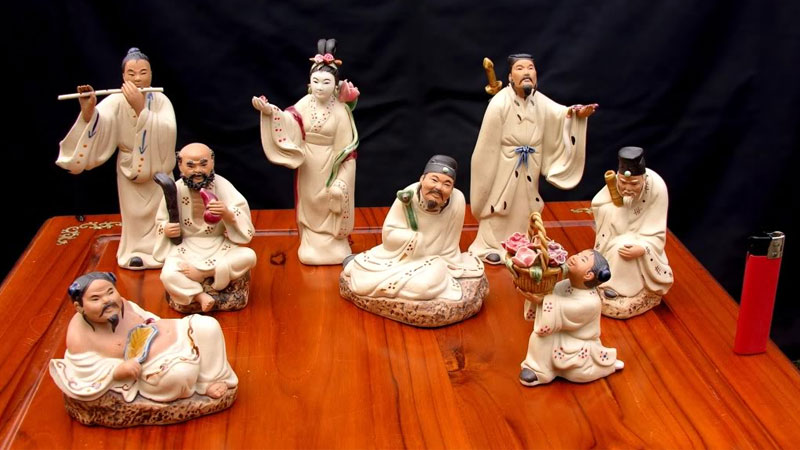 Place the Eight Immortals in high and positive locations
Place the Eight Immortals in high and positive locations
When Displaying Individual Immortals
As each immortal has their unique path to immortality and symbolizes different aspects of fortune, consider the following when displaying them individually:
- Li Tieguai: Face him toward the south, representing the fire element.
- Han Zhongli: Face him toward the east, representing the wood element.
- Cao Guojiu: Face him toward the northeast, representing the earth element.
- Lü Dongbin: Face him toward the west, representing the metal element.
- Lan Caihe: Face him toward the northwest, representing the metal element.
- Zhang Guolao: Face him toward the north, representing the water element.
- Han Xiangzi: Face him toward the southeast, representing the wood element.
- He Xiangu: Face her toward the southwest, representing the earth element.
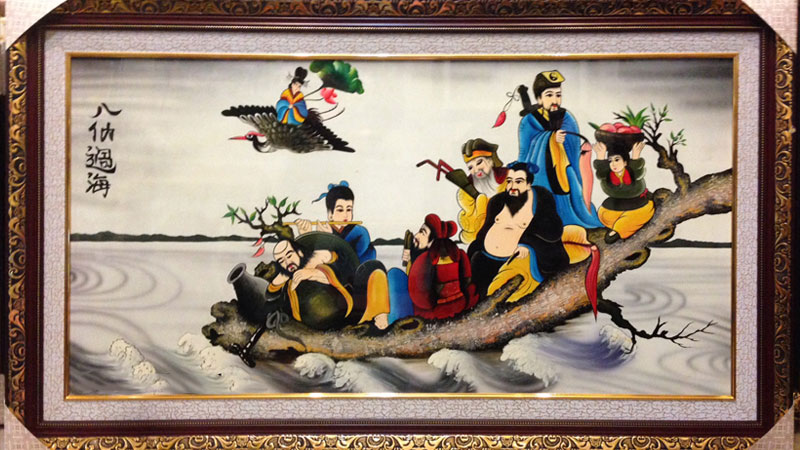 Display individual immortals according to their corresponding directions
Display individual immortals according to their corresponding directions
This article has provided insights into the Eight Immortals, their identities, and their significance in Feng Shui. We hope you found this information helpful and enlightening.
2. Han Xiangzi – Known for his mastery of music and the arts, he represents creativity and is associated with the direction South and the element of Fire.
3. Lan Caihe – A mysterious figure, often depicted as androgynous, representing spontaneity and unpredictability. Associated with the direction North and the element of Water.
4. Li Tieguai – He is known for his magical staff and gourd, representing healing and longevity. Associated with the direction West and the element of Metal.
5. Lü Dongbin – A poet and taoist master, representing knowledge and enlightenment. Associated with the direction Northeast and the element of Earth.
6. Han Zhongli – Known for his strength and martial arts skills, he represents protection and is associated with the direction Southwest and the combination of Metal and Earth elements.
7. Zhang Guolao – Represents longevity and often depicted with a donkey. Associated with the direction Southeast and the element of Wind.
8. Cao Guojiu – A diplomat and scholar, representing career success and social skills. Associated with the direction Northwest and a combination of Water and Metal elements.
2023 Lunar New Year Gift Ideas for Older Family and Friends
As 2021 approaches, families worldwide are gathering to celebrate the special bond between grandparents and their grandchildren. To show their love and admiration, these thoughtfully chosen gifts will bring a smile to the face of the elderly. Here, we have compiled a list of the 13 most meaningful Tet presents that can bring joy to our beloved grandparents.



























